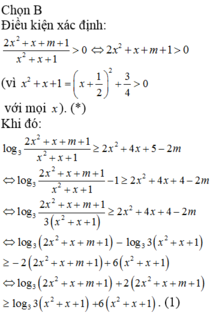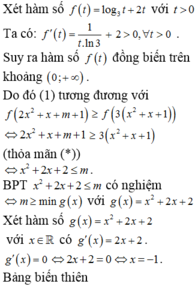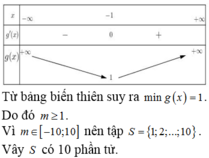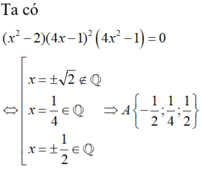số phần tử của tập hợp : A={xϵR|(2x2 +x-4)2=4x2-4x+1 là
Hãy nhập câu hỏi của bạn vào đây, nếu là tài khoản VIP, bạn sẽ được ưu tiên trả lời.


a, A = { 1 ; 3 ; 5 ; 7 ; 9 } .
b, { 3 ; 7 } .
{ 1 ; 5 ; 3 ; 9 } .

\(A=\left(2x-1\right)^2+9\ge9\\ A_{min}=9\Leftrightarrow x=\dfrac{1}{2}\\ B=2\left(x^2-2\cdot\dfrac{3}{4}x+\dfrac{9}{16}\right)+\dfrac{1}{8}=2\left(x-\dfrac{3}{4}\right)^2+\dfrac{1}{8}\ge\dfrac{1}{8}\\ B_{min}=\dfrac{1}{8}\Leftrightarrow x=\dfrac{3}{4}\\ C=\left(4x^2+4xy+y^2\right)+2\left(2x+y\right)+1+\left(y^2+4y+4\right)-4\\ C=\left[\left(2x+y\right)^2+2\left(2x+y\right)+1\right]+\left(y+2\right)^2-4\\ C=\left(2x+y+1\right)^2+\left(y+2\right)^2-4\ge-4\\ C_{min}=-4\Leftrightarrow\left\{{}\begin{matrix}2x=-1-y\\y=-2\end{matrix}\right.\Leftrightarrow\left\{{}\begin{matrix}x=-\dfrac{3}{2}\\y=-2\end{matrix}\right.\)
\(D=\left(3x-1-2x\right)^2=\left(x-1\right)^2\ge0\\ D_{min}=0\Leftrightarrow x=1\\ G=\left(9x^2+6xy+y^2\right)+\left(y^2+4y+4\right)+1\\ G=\left(3x+y\right)^2+\left(y+2\right)^2+1\ge1\\ G_{min}=1\Leftrightarrow\left\{{}\begin{matrix}3x=-y\\y=-2\end{matrix}\right.\Leftrightarrow\left\{{}\begin{matrix}x=\dfrac{2}{3}\\y=-2\end{matrix}\right.\)
\(H=\left(x^2-2xy+y^2\right)+\left(x^2+2x+1\right)+\left(2y^2+4y+2\right)+2\\ H=\left(x-y\right)^2+\left(x+1\right)^2+2\left(y+1\right)^2+2\ge2\\ H_{min}=2\Leftrightarrow\left\{{}\begin{matrix}x=y\\x=-1\\y=-1\end{matrix}\right.\Leftrightarrow x=y=-1\)
Ta luôn có \(\left(x-y\right)^2+\left(y-z\right)^2+\left(z-x\right)^2\ge0\)
\(\Leftrightarrow2x^2+2y^2+2z^2-2xy-2yz-2xz\ge0\\ \Leftrightarrow x^2+y^2+z^2\ge xy+yz+xz\\ \Leftrightarrow x^2+y^2+z^2+2xy+2yz+2xz\ge3xy+3yz+3xz\\ \Leftrightarrow\left(x+y+z\right)^2\ge3\left(xy+yz+xz\right)\\ \Leftrightarrow\dfrac{3^2}{3}\ge xy+yz+xz\\ \Leftrightarrow K\le3\\ K_{max}=3\Leftrightarrow x=y=z=1\)

Bài 4: Cho tập hợp A = {1; 2;3; x; a; b}
a/ Hãy chỉ rõ các tập hợp con của A có 1 phần tử.
Các tập con của A có 1 phần tử: {1}, {2}, {3}, {x}, {a}, {b}
b/ Hãy chỉ rõ các tập hợp con của A có 2 phần tử.
{1;2}, {1;3}; {1;x}; {1;a}; {1;b}; {2;3}; {2;x}; {2;a}; {2;b}; {3;x}; {3;a}; {3;b}; {x;a}; {x;b}; {a;b}
c/ Tập hợp B = {a, b, c} có phải là tập hợp con của A không?
B={a;b;c} không phải tập hợp con của A vì c không phải là một phần tử trong tập hợp A.
Bài 2: Hãy tính số phần tử của các tập hợp sau:
a/ Tập hợp A các số tự nhiên lẻ có 3 chữ số.
A={101;103;105;...;997;999}
Số phần tử của tập hợp A: (999-101):2 + 1 = 450 (phần tử)
b/ Tập hợp B các số 2, 5, 8, 11, …, 296, 299, 302
B= {2;5;8;11;...;296;299;302}
Số phần tử của tập hợp B: (302 - 2): 3 +1= 101 (phần tử)
c/ Tập hợp C các số 7, 11, 15, 19, …, 275 , 279
C={7;11;15;19;...;275;279}
Số phần tử của tập hợp C: (279-7):4 + 1 = 69 (phần tử)

a: \(A=\left\{1;-5\right\}\)
b: \(B=\left\{1;2\right\}\)
c: \(C=\left\{0;1;4;9;16;25;36;49\right\}\)
d: \(D=\left\{1;2;3;6\right\}\)
e: E={8}


Có 5 tập hợp con của A mà có 4 phần tử.
Viết được 6 tập hợp, mỗi tập hợp gồm 1 phần tử của A, 1 phần tử của B.




\(\left(2x^2+x-4\right)^2=4x^2-4x+1\)
\(\Leftrightarrow\left(2x^2+x-4\right)^2=\left(2x-1\right)^2\)
\(\Leftrightarrow\left|2x^2+x-4\right|=\left|2x-1\right|\)
\(\Leftrightarrow\left[{}\begin{matrix}2x^2+x-4=2x-1\\2x^2+x-4=-2x+1\end{matrix}\right.\)
\(\Leftrightarrow\left[{}\begin{matrix}x=\dfrac{3}{2}\\x=-1\\x=1\\x=-\dfrac{5}{2}\end{matrix}\right.\)
\(\Rightarrow A=\left\{-\dfrac{5}{2};-1;1;\dfrac{3}{2}\right\}\)
A có 4 phần tu